人教版(2019)必修 第一册Unit 2 Travelling around Discovering Useful Structures课件(共17张PPT)
文档属性
| 名称 | 人教版(2019)必修 第一册Unit 2 Travelling around Discovering Useful Structures课件(共17张PPT) | 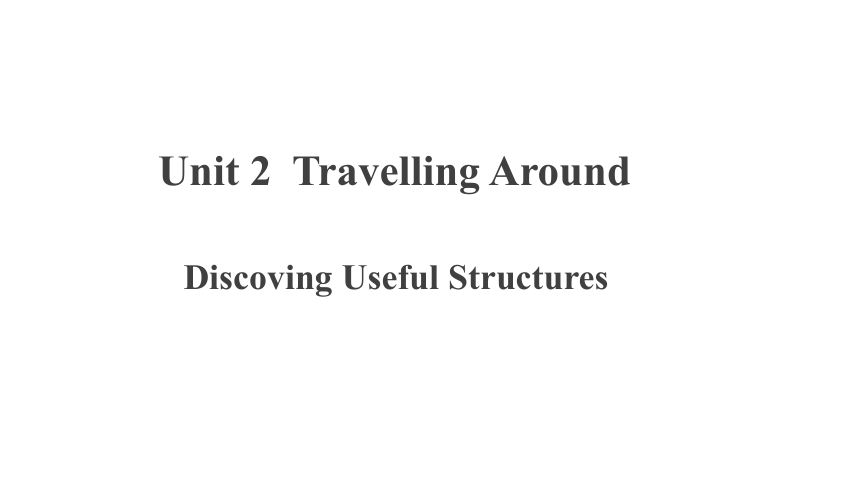 | |
| 格式 | pptx | ||
| 文件大小 | 667.0KB | ||
| 资源类型 | 教案 | ||
| 版本资源 | 人教版(2019) | ||
| 科目 | 英语 | ||
| 更新时间 | 2024-04-01 20:25:23 | ||
图片预览

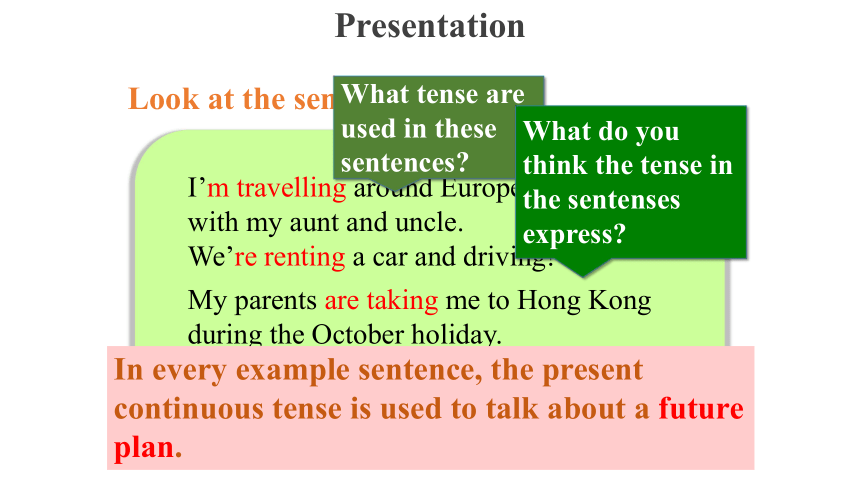
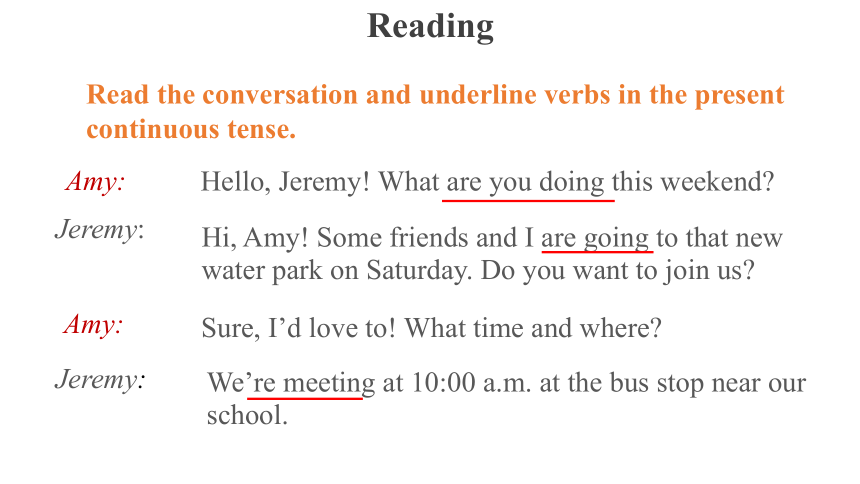
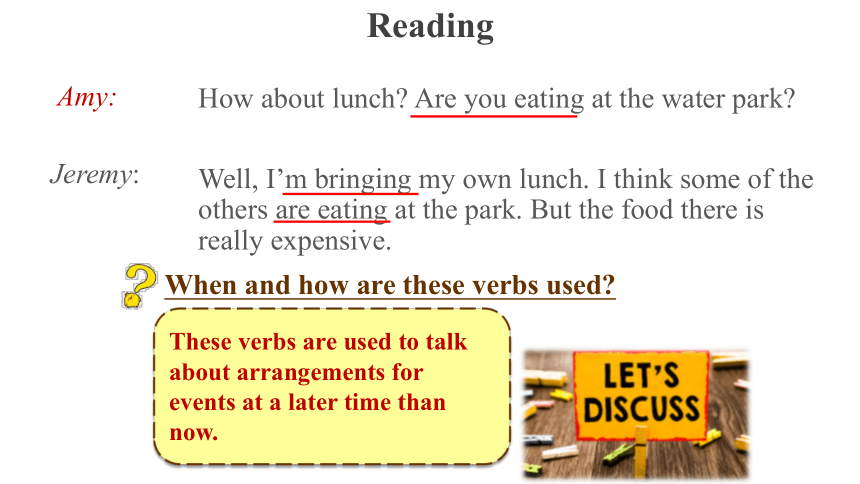
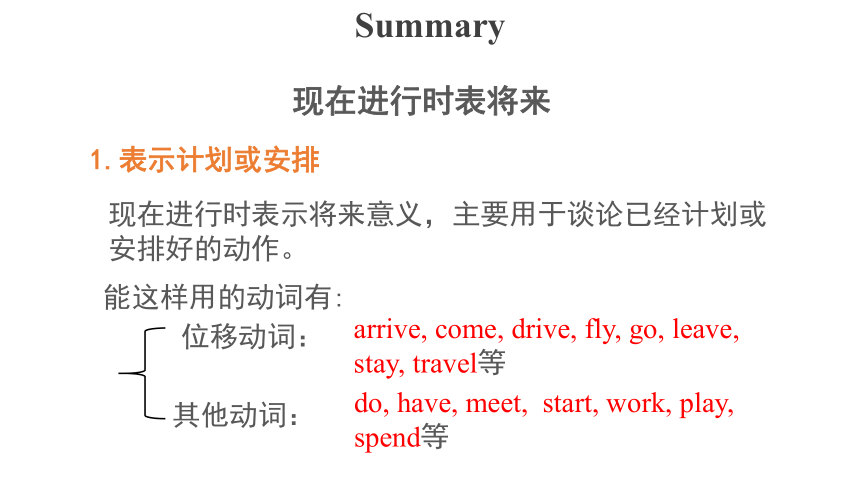
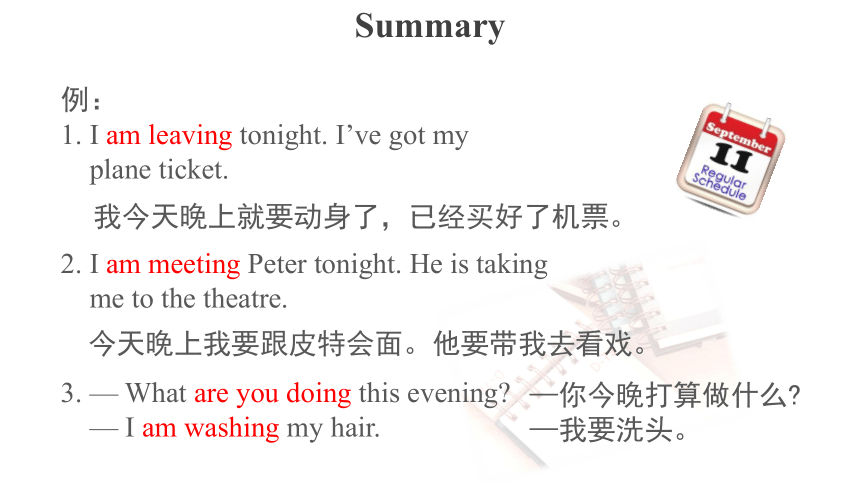
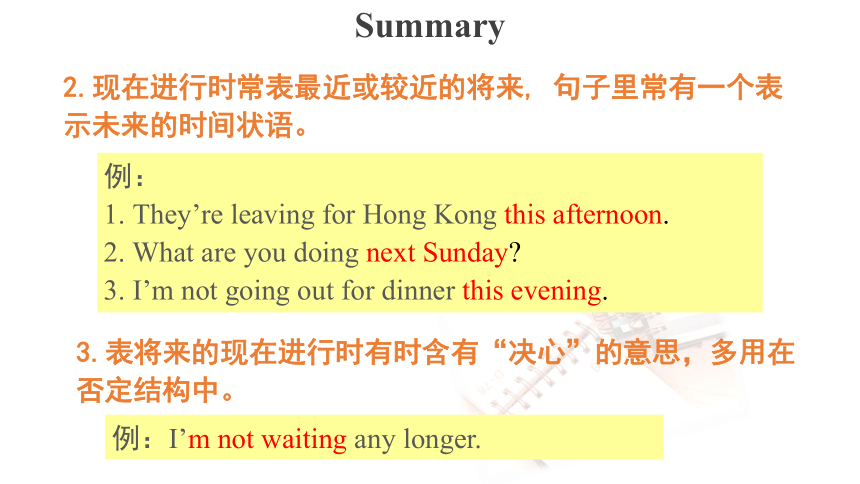
文档简介
(共17张PPT)
Discoving Useful Structures
Unit 2 Travelling Around
Presentation
Look at the sentences.
I’m travelling around Europe for two weeks with my aunt and uncle.
We’re renting a car and driving!
My parents are taking me to Hong Kong during the October holiday.
In every example sentence, the present continuous tense is used to talk about a future plan.
What tense are used in these sentences
What do you think the tense in the sentenses express
Reading
Amy:
Hello, Jeremy! What are you doing this weekend
Jeremy:
Hi, Amy! Some friends and I are going to that new water park on Saturday. Do you want to join us
Amy:
Sure, I’d love to! What time and where
Jeremy:
We’re meeting at 10:00 a.m. at the bus stop near our school.
Read the conversation and underline verbs in the present continuous tense.
Reading
Amy:
How about lunch Are you eating at the water park
Jeremy:
Well, I’m bringing my own lunch. I think some of the others are eating at the park. But the food there is really expensive.
When and how are these verbs used
These verbs are used to talk about arrangements for events at a later time than now.
Summary
现在进行时表将来
1.表示计划或安排
现在进行时表示将来意义,主要用于谈论已经计划或安排好的动作。
能这样用的动词有:
位移动词:
arrive, come, drive, fly, go, leave, stay, travel等
其他动词:
do, have, meet, start, work, play, spend等
Summary
例:
1. I am leaving tonight. I’ve got my
plane ticket.
2. I am meeting Peter tonight. He is taking
me to the theatre.
3. — What are you doing this evening
— I am washing my hair.
我今天晚上就要动身了,已经买好了机票。
今天晚上我要跟皮特会面。他要带我去看戏。
—你今晚打算做什么
—我要洗头。
Summary
2.现在进行时常表最近或较近的将来, 句子里常有一个表示未来的时间状语。
例:
1. They’re leaving for Hong Kong this afternoon.
2. What are you doing next Sunday
3. I’m not going out for dinner this evening.
3.表将来的现在进行时有时含有“决心”的意思,多用在否定结构中。
例:I’m not waiting any longer.
Summary
4.现在进行时也可在时间、条件或原因状语从句中表示将来。
例:
1. When you are passing my house, please
drop in.
2. If they are not doing it, what should I do
3. Because the bride is coming, all the
people are pleased.
Summary
表示将来的动作或状态还可用以下几种形式:
1. will / shall+动词原形
I shall be seventeen years old next month.
2. be going to+动词原形
We are going to have a meeting today.
表示个人意愿和瞬间决定
She will arrive in Shanghai tomorrow.
表示说话者的打算和意图
Summary
3. be to+动词原形
Are we to go on with this work
4. be about to+动词原形
He was about to leave when someone
called him.
表示已经确定日程的将来
The meeting is to be held next week.
表示马上就要进行的动作,不与表示将来的时间状语连用
Practice
1. Ladies and gentlemen, please fasten your
seat belts. The plane___________ (take off).
2. The train from Beijing to Xi’an ________
(arrive) at 3:00 p.m.
3. —Are you still busy
—Yes, I____________ (finish) my work,
and it won't take long.
一、用所给词的适当形式填空。
is taking off
is arriving
am finishing
Practice
4. My uncle ___________ (come) to see me.
He'll be here soon.
5. At this time tomorrow,
we __________ (fly)
over the Atlantic.
is coming
are flying
Practice
1. 玛丽和我下个星期天去钓鱼。
2. 我明天将什么东西也不做。
3. 他下个月将去美国吗?
4. 你在西安要待多久?
5. 我听说你将要沿着湄公河旅行。
I am not doing anything tomorrow.
Is he going to America next month
How long are you staying in Xi’an
I hear that you are travelling along the Mekong River.
二、翻译句子。
Mary and I are going fishing next Sunday.
Production
Read the sentences and tick those that express future plans. Rewrite them in the present continuous tense.
____ I’ve just booked my air ticket! I’ll visit
my grandparents in December.
____ Gary might visit China next year,
but he’s still not sure.
I am visiting my grandparents in December.
Production
____ Could you help me with this box,
please I’m afraid I’m going to drop it.
____ A: Hey, are you free for dinner tonight
B: I’ m sorry, no. I’ll have dinner with
my cousins tonight.
____ Kate has been invited to a meeting in
Iceland. She will apply for a visa soon.
She is applying for a visa soon.
I’m having dinner with my cousins tonight.
Assignment
Discuss weekend plans with a partner, based on the weather report below.
Example:
A: What are you doing on Saturday morning
B: Well, it’s going to be sunny in the morning
and not very windy, so I’m having a picnic
with my friends.
Goodbye!
Discoving Useful Structures
Unit 2 Travelling Around
Presentation
Look at the sentences.
I’m travelling around Europe for two weeks with my aunt and uncle.
We’re renting a car and driving!
My parents are taking me to Hong Kong during the October holiday.
In every example sentence, the present continuous tense is used to talk about a future plan.
What tense are used in these sentences
What do you think the tense in the sentenses express
Reading
Amy:
Hello, Jeremy! What are you doing this weekend
Jeremy:
Hi, Amy! Some friends and I are going to that new water park on Saturday. Do you want to join us
Amy:
Sure, I’d love to! What time and where
Jeremy:
We’re meeting at 10:00 a.m. at the bus stop near our school.
Read the conversation and underline verbs in the present continuous tense.
Reading
Amy:
How about lunch Are you eating at the water park
Jeremy:
Well, I’m bringing my own lunch. I think some of the others are eating at the park. But the food there is really expensive.
When and how are these verbs used
These verbs are used to talk about arrangements for events at a later time than now.
Summary
现在进行时表将来
1.表示计划或安排
现在进行时表示将来意义,主要用于谈论已经计划或安排好的动作。
能这样用的动词有:
位移动词:
arrive, come, drive, fly, go, leave, stay, travel等
其他动词:
do, have, meet, start, work, play, spend等
Summary
例:
1. I am leaving tonight. I’ve got my
plane ticket.
2. I am meeting Peter tonight. He is taking
me to the theatre.
3. — What are you doing this evening
— I am washing my hair.
我今天晚上就要动身了,已经买好了机票。
今天晚上我要跟皮特会面。他要带我去看戏。
—你今晚打算做什么
—我要洗头。
Summary
2.现在进行时常表最近或较近的将来, 句子里常有一个表示未来的时间状语。
例:
1. They’re leaving for Hong Kong this afternoon.
2. What are you doing next Sunday
3. I’m not going out for dinner this evening.
3.表将来的现在进行时有时含有“决心”的意思,多用在否定结构中。
例:I’m not waiting any longer.
Summary
4.现在进行时也可在时间、条件或原因状语从句中表示将来。
例:
1. When you are passing my house, please
drop in.
2. If they are not doing it, what should I do
3. Because the bride is coming, all the
people are pleased.
Summary
表示将来的动作或状态还可用以下几种形式:
1. will / shall+动词原形
I shall be seventeen years old next month.
2. be going to+动词原形
We are going to have a meeting today.
表示个人意愿和瞬间决定
She will arrive in Shanghai tomorrow.
表示说话者的打算和意图
Summary
3. be to+动词原形
Are we to go on with this work
4. be about to+动词原形
He was about to leave when someone
called him.
表示已经确定日程的将来
The meeting is to be held next week.
表示马上就要进行的动作,不与表示将来的时间状语连用
Practice
1. Ladies and gentlemen, please fasten your
seat belts. The plane___________ (take off).
2. The train from Beijing to Xi’an ________
(arrive) at 3:00 p.m.
3. —Are you still busy
—Yes, I____________ (finish) my work,
and it won't take long.
一、用所给词的适当形式填空。
is taking off
is arriving
am finishing
Practice
4. My uncle ___________ (come) to see me.
He'll be here soon.
5. At this time tomorrow,
we __________ (fly)
over the Atlantic.
is coming
are flying
Practice
1. 玛丽和我下个星期天去钓鱼。
2. 我明天将什么东西也不做。
3. 他下个月将去美国吗?
4. 你在西安要待多久?
5. 我听说你将要沿着湄公河旅行。
I am not doing anything tomorrow.
Is he going to America next month
How long are you staying in Xi’an
I hear that you are travelling along the Mekong River.
二、翻译句子。
Mary and I are going fishing next Sunday.
Production
Read the sentences and tick those that express future plans. Rewrite them in the present continuous tense.
____ I’ve just booked my air ticket! I’ll visit
my grandparents in December.
____ Gary might visit China next year,
but he’s still not sure.
I am visiting my grandparents in December.
Production
____ Could you help me with this box,
please I’m afraid I’m going to drop it.
____ A: Hey, are you free for dinner tonight
B: I’ m sorry, no. I’ll have dinner with
my cousins tonight.
____ Kate has been invited to a meeting in
Iceland. She will apply for a visa soon.
She is applying for a visa soon.
I’m having dinner with my cousins tonight.
Assignment
Discuss weekend plans with a partner, based on the weather report below.
Example:
A: What are you doing on Saturday morning
B: Well, it’s going to be sunny in the morning
and not very windy, so I’m having a picnic
with my friends.
Goodbye!
